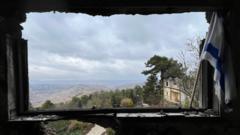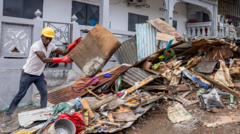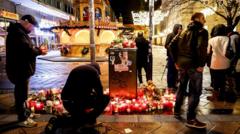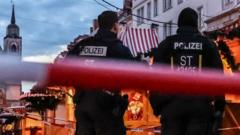In the wake of a ceasefire with Hezbollah, Kibbutz Menara residents like Meitel are returning to assess the severe damage inflicted over 14 months of conflict. While promises of a safe return are made by Israeli officials, many locals express skepticism about the security and viability of returning to their homes amidst lingering tensions along the border.
Israelis Assess Damage and Contemplate Return Amid Ceasefire with Hezbollah

Israelis Assess Damage and Contemplate Return Amid Ceasefire with Hezbollah
As a ceasefire unfolds between Israel and Hezbollah, residents of Kibbutz Menara grapple with extensive destruction, fueling concerns about long-term safety and recovery.
In Kibbutz Menara, northern Israel, residents are cautiously evaluating the damage as the ceasefire with Hezbollah begins. This kibbutz, directly facing the Lebanese village of Meiss el-Jabal, has been profoundly affected, with three-quarters of its buildings reported damaged. The first day of the ceasefire was marked by the sound of gunfire around the area, although the Israeli military indicated this was more a measure to deter potential threats than active conflict.
Meitel, a resident returning for the first time since 8 October 2023, described the experience of coming back to her home as surreal, surrounded by devastation due to the conflict that escalated following the Hamas attack. The resident expressed her disbelief over the damage that marked their kibbutz. Israeli officials have vowed to restore safety and order so that displaced residents can return reliably, highlighting military achievements over Hezbollah in recent operations.
Despite the official assurances, there are lingering fears among the kibbutz's residents regarding a safe return. Meitel expressed concerns about returning while gunfire still pierced through the stillness of Menara’s streets. The ongoing situation reflects a complex reality where residents feel caught between hope and apprehension.
The damages in Menara are profound: destroyed infrastructures like electricity, sewage, and gas, along with homes peppered with shrapnel wounds and missile holes. Orna, another resident, is adamant about not having families return due to persistent dangers, asserting that measures would be taken to secure the area against any potential threats.
As discussions about the return of residents unfold under the ceasefire, the physical and psychological scars left by the conflict present a considerable obstacle to long-term recovery. Rebuilding will require significant time and resources, but the more daunting task remains restoring the peace of mind lost through years of violence and uncertainty. Residents reflect on the dual challenges of rebuilding their community while safeguarding it from resurgent threats along the volatile border.




















